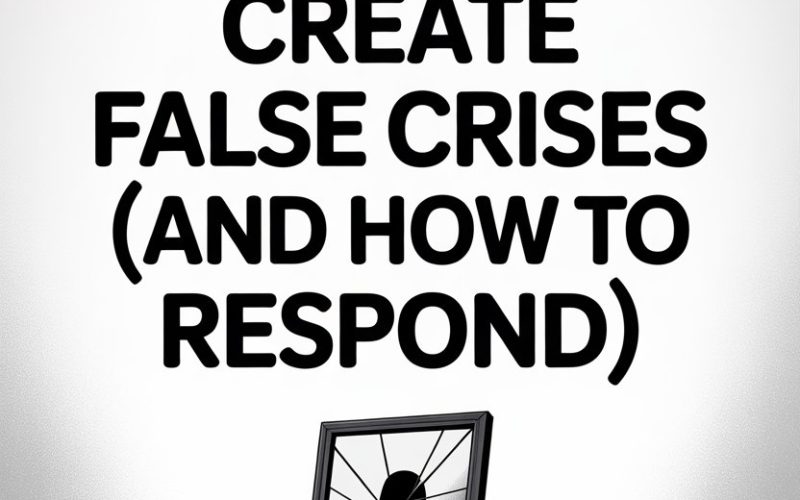Grab three minutes and a lukewarm cuppa—because parenting has enough surprises without running into someone who can whip up drama as fast as they can unclip a car seat.
If you’re dealing with a narcissist in your family orbit (ex, co-parent, grandparent, or even the neighbor who always has ‘urgent’ opinions about your pram choice), you’ve probably noticed an odd pattern: Everything is an emergency, and you’re expected to drop everything and leap into action—preferably while applauding their heroism for “alerting” you in the first place.
If that feels familiar, you’re not alone.
Understanding why narcissists manufacture these emotional fire drills—and what you can do about it—might just save your sanity (and maybe your Sunday roast).
The Art of the Manufactured Emergency
Narcissists crave attention like toddlers crave biscuits. And nothing hoovers up oxygen in a room quite like a crisis. Creating false emergencies is a nifty way for them to become the sun around which everyone else must orbit.
Parenting expert Dr. Ramani Durvasula notes that narcissists thrive on control and chaos, shifting focus onto themselves and away from anyone else’s needs.
There’s always some “urgent” issue. Little Timmy’s bedtime routine is apparently life-or-death. The Christmas play is suddenly a federal case because someone else was picked as shepherd number two.
Or perhaps, your ex sends a flurry of texts because your kid forgot their water bottle—never mind that it’s 8:30 at night.
What’s going on here? It’s not just run-of-the-mill drama. Fabricating crises serves a few core purposes for narcissists:
- Re-centering attention on themselves
- Testing boundaries to see who will jump
- Disrupting others’ plans and peace
- Gaining sympathy (“Look what I have to deal with!”)
- Avoiding accountability (“It wasn’t my fault, there was a crisis!”)
The result? You end up frazzled, your children sense the tension, and the narcissist walks away with the spotlight (and sometimes, the moral high ground).
Why the False Alarm Button Gets Pressed
Narcissists didn’t just wake up one morning and decide chaos was a top-tier hobby. Psychologists like Craig Malkin have found that this pattern is rooted in childhood—often a mix of insecurity and entitlement.
When they feel irrelevant, bored, or threatened, they conjure a fire drill. If things are too calm, they poke the beehive. Even positive attention can feel threatening if it’s not about them.
This is rarely conscious or planned; it’s more reflex than strategy. Think Pavlov’s dogs, but with iPhones and a taste for melodrama.
Narcissists are hypersensitive to any shift that might make them feel less important, less adored, or less in control. So, when your child’s teacher emails you instead of them, or Grandma wants to host Christmas, a “crisis” is born.
Parents, You’re Not Mistaken: This Is Exhausting
If you’re reading this while hiding in the loo for a moment’s peace, know that your instincts are spot-on. False crises can drain your energy and leave you wondering if you’re the problem, or just bad at handling “stress.” That’s not the case.
Narcissists are masterful at making others feel responsible for their emotional state. They present their chaos as an emergency only you can fix—often with a healthy side of guilt-tripping.
And, because parents are hard-wired to respond to emergencies, you rush in. Every. Single. Time.
How Kids Get Caught in the Crossfire
Children are brilliant little barometers for family tension. When narcissists manufacture emergencies, kids absorb both the drama and the message: “Big feelings get big reactions.”
This can shape how they express needs—or, more likely, how they hide them to avoid setting mum or dad off.
Shared custody arrangements get particularly rocky. Narcissistic co-parents may use false crises to disrupt routines, unsettle kids, and undermine your confidence.
Suddenly, you’re fielding accusations about missed dentist appointments or packing the “wrong” school snack.
Clinical psychologist Dr. Karyl McBride describes this as emotional manipulation designed to keep everyone on edge—except, of course, the narcissist. They feel just fine.
How to Respond When the Alarm Bells Ring
Now for what you really want: practical steps that work when a narcissist hits the panic button.
Spot the Pattern
When the same person always seems to be at the epicenter of family crises, take note. You’re likely dealing with a pattern, not a series of one-offs.
Keeping a brief log (mental or otherwise) of these moments can help you see the frequency and absurdity of the emergencies. It’s not overthinking—it’s protecting your peace.
Breathe, Then Pause
Narcissists rely on instant reactions. Give yourself permission to be the world’s slowest responder. “Let me check and get back to you” buys precious time.
It’s fine to respond to non-urgent situations after dinner, or after you’ve had a minute to think.
This isn’t rudeness; it’s self-preservation. Over time, the lack of immediate drama response teaches the narcissist that you’re not their on-call crisis manager.
Stick To the Facts
Drama grows in the gaps of uncertainty. When the narcissist claims the school called “about an emergency,” ask for specific details: Who called? What exactly happened?
If the story grows wobbly or keeps changing, you’re likely not dealing with an actual emergency.
Clear, factual responses are your best friend. “I spoke with the school and they said everything is fine,” is a magic phrase. Keep your tone neutral, your sentences short, and your boundaries firm.
Limit Emotional Fuel
Narcissists feast on big reactions. If you respond with outrage or panic, you’re playing into their script. Practice the art of the deadpan or the “grey rock” response: calm, minimal, boring.
If you need to vent, save it for your mate, your WhatsApp group, or that one school mum who always brings the good biscuits. Kids don’t need to see you unravel to understand that you care.
Set Boundaries (And Hold Them)
Boundaries are not just for toddlers learning not to lick the dog. They work wonders with adults too. Decide what you will and won’t engage with, and repeat your boundaries calmly.
Examples:
- “If this isn’t an emergency, I’ll address it tomorrow.”
- “I only respond to messages between 8am and 7pm.”
- “If you have a genuine safety concern, call emergency services.”
The narcissist may escalate the drama when you start enforcing limits—this is known as an “extinction burst.” Stand firm. Eventually, the circus moves on (or at least, becomes less eager to perform in your living room).
Don’t Try to Fix or Convince
Here’s the kicker: You won’t “logic” a narcissist out of their crisis. Trying to fix the emotional weather only exhausts you.
You’re not required to solve their invented emergencies. You’re not required to convince them that nothing is wrong.
Acknowledge the concern (if you must), but don’t get sucked into debates or explanations. “I see you’re upset. I’ll follow up if something actually needs action.” That’s all you owe.
Protect Your Kids’ Peace
Your children need to know that adults can handle stress without explosions.
Narrate the situation in age-appropriate terms: “Sometimes people get upset and make things seem bigger than they are. We can stay calm and focus on what’s true.”
Shield them from the emotional tornado as much as possible. If your co-parent is the culprit, keep your communication with the kids factual and reassuring.
The less drama they see you absorb, the more secure they’ll feel.
Find Your Support System
Managing a narcissist’s false emergencies is a marathon, not a sprint. Talk with trusted friends, a therapist, or a support group for parents dealing with high-conflict personalities.
You’re not alone, and you’re not overreacting.
Online resources such as Parenting with a Narcissist offer practical tips and stories from others in the same boat. Sometimes, just knowing you’re not the only one fielding 11pm “emergency” texts is enough to keep you going.
When to Seek Help
Occasionally, a narcissist’s “emergencies” stray into dangerous territory—threats, manipulation meant to isolate you from support, or using the kids as pawns.
If you’re worried for your safety or your children’s, reach out to a professional or local support service immediately. Trust your instincts.
Why It’s Not About You
False crises say much more about the narcissist’s inner world than they do about your parenting. Their chaos is a reflection of their own needs, anxieties, and emptiness—not your failings as a parent.
You’re not required to join every circus you’re invited to.
Sometimes, the best thing you can do for your children—and for yourself—is to model calm, resilient responses. Your kids will learn that not every raised voice means disaster, and not every text marked “urgent” is actually urgent.
You’ve Got This
Parenting is wild enough without extra drama from someone who loves to press the crisis button. Recognising the pattern gives you power. Setting boundaries gives you space.
Refusing to play the lead in someone else’s drama? That’s the real victory lap.
Go ahead—finish your tea. The only alarm bell you need to answer tonight is the one on the oven.
And maybe your toddler’s request for “just one more story.”





